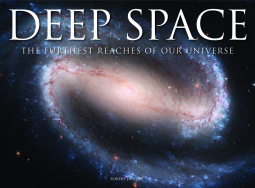Space camp! [Deep Space by Robert Harvey]
Travelling from the edge of our Solar System, through the Milky Way and to the outer edges of the observable universe, Deep Space is a spectacular photographic guide to galaxies, nebulae, supernova, clusters, black holes and quasars. Learn about the birth of stars in our own galaxy, planets beyond our own solar system, when they were first discovered and how we have managed to photograph these places. Ranging from the Magellanic Clouds within the Milky Way to stellar life cycles, from other spiral galaxies such as the Andromeda Galaxy, to the Sombrero Galaxy, and from nebulae such as the Pillars of Creation to black and white dwarfs, this is accessibly written for the general reader to grasp the science and magnitude of deep space. Featuring 200 outstanding colour photographs and expert captions, Deep Space is most certainly out of this world.
I think it must have been a sobering thing, when I came to grips with the fact that I was just too poor to go to space camp. And that's a really random intro but there it is. I was a child brought up on space fact and fiction. Star Trek filled our primetime evenings. Sci-fi movies were a foregone conclusion. The year I spent with my aunt in Dominican Republic? My telescope came with me. Either I had a subscription or my mother just bought issues infrequently, but back in the 90s, when magazines were still hot, I remember having issues of magazines that were heavily focused on stargazing (likely Astronomy, Air & Space, Scientific American). In fact, I remember it so well because I remember oogling over the ads for the fancy telescopes, manifesting in my mind the day I would own such a tool. I had my constellation field guides. I used to be nuts about constellations. I generally used to be nuts about space. Shoot, I wanted to be an aerospace engineer. But one grows older, and as with friendships and passions in general, you drift apart from what was once close to your heart.
Robert Harvey's Deep Space was a journey back to the space-obsessed mindset that was once my daily routine (I also had posters of the solar system - I was that kid). I took a general astronomy class in college, but we didn't go that deep. More likely than not, a deep dislike for physics, one realized in my teen years, contributed heavily to my gradual schism with astronomical studies. Reading this book I had to search up terms and cross-reference with official and academic references to get the most out of the blurbs that accompanied that fantastic photographs. I felt like a little kid again. I never got that much into nebulas or galaxy morphology, so that was fun. Binary black holes?! I hadn't heard of that (though my sci-fi breathing mother surely did)! [Side note: NGC 6240 is really wild.]
You really can't go wrong with space photography. The one issue I had reading through were images split between two pages. I imagine the landscape layout will work well in a physical copy, but reading it digitally wasn't the most comfortable experience. But a quick Google search ironed out that issue anyway, so overall this was a fantastic read. 5 stars from me. I was a star-studded event.
Deep Space is due for publication October 14, 2020.

Comments
Post a Comment